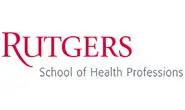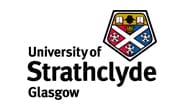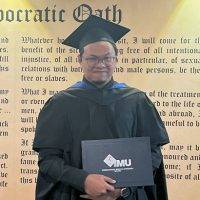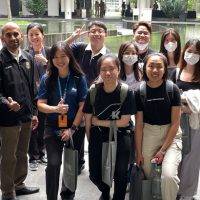ABOUT
Health Informatics and Analytics is a discipline that combines healthcare, information technology and artificial intelligence. As one of the fastest growing economic sectors worldwide, Health Informatics (also referred to as Digital Health) is, in many countries, creating job opportunities twice as fast as any other economic sector.

Health Informatics and Analytics
(Postgraduate Certificate / Postgraduate Diploma / Master)
IMU’s one-year full-time Master in Health Informatics and Analytics programme – also available part-time – provides the perfect pathway for recent graduates or professionals from various areas who intend to move their career into this area of the healthcare sector. This is also an ideal programme for current health and social care practitioners who are looking to gain additional knowledge and skills in digital innovation.
Delivered by a multidisciplinary team of experts in computing and health-related disciplines, students in this programme will be able to learn about state-of-the-art technologies and systems, either related to IT (for example data analytics, mobile applications, sensors and wearables) or healthcare (for example electronic health records and remote monitoring).
The programme offers an accelerated, modular and blended learning to provide more flexibility to working professionals in the form of online study options. In order to ensure a rounded understanding of the issues to formulate intervention and value creation strategies in class simulation or actual industry-based intervention, students will have to undergo a robust curriculum that involves lectures, tutorials, case studies, written assignments, group projects, presentations and discussion boards.
Key Facts
Why Health Informatics and Analytics at IMU?
An Established Private Healthcare University
IMU is Malaysia’s first and most established private medical and healthcare university with over 30 years of dedicated focus in healthcare education.
IMU achieved the SETARA-2018/2019 Tier 6 status (Outstanding) under the Mature University category.
Flexible Learning Options
A carefully designed programme with blended learning which enables working adults to fit their studies around their work, family and other commitments.
The curriculum of this programme is carefully planned and aligned to meet the expectations in the field of health informatics and analytics.
Interdisciplinary Environment
Students will be embedded within a unique, diverse, collaborative, interdisciplinary ecosystem integrating highly experienced faculty and leaders in the industry as guest lecturers, and they will be exposed to a rich training ground for the next generation of health IT specialist and data scientists.
Understanding the Value of Health Information
Students will acquire principles governing health informatics and analytics within realworld healthcare settings.
They will also learn the value of health information, health information systems and their integration, and the role of information-related technologies in delivering healthcare in the 21st century.
Entrepreneurial Skills
Participants to this programme will gain practical experience of working within diverse, multi- disciplinary environments across the healthcare sector and associated industries, and develop effective communication and delivery skills within the wider healthcare landscape.
Programme Structure
| Postgraduate Certificate | Postgraduate Diploma | Master | ||
|---|---|---|---|---|
| SEMESTER 1 | ||||
| Subject | ||||
| Health Systems and Informatics
Emerging trends and governance in Global Health, basic functions and building blocks of Health Systems and Health Informatics. |
Core | √ | √ | √ |
| Health Data Collection and Preparation
Introduction to data science, data storage and management, data transformation and cleaning. |
Core | √ | √ | √ |
| Health Data Analytics
Basic concepts of machine learning algorithms, such as supervised learning, unsupervised learning, deep learning and reinforced learning. |
Core | √ | √ | √ |
| Health Data Management
Relational database systems, Big Data management, data management solutions for Data Analytics |
Core | √ | √ | √ |
| Research Methodology and Scientific Writing
Introduction to healthcare research, design approaches and methodologies used in healthcare research projects |
Core | √ | ||
| Elective | E | √ | √ | √ |
| TOTAL | 20 | 20 | 20 | |
| Postgraduate Certificate | Postgraduate Diploma | Master | ||
|---|---|---|---|---|
| SEMESTER 2 | ||||
| Subject | ||||
| Advanced Health Informatics
Novel healthcare applications that make use of advanced informatics technologies. |
Core | √ | √ | |
| Health Data Visualisation
How to create meaningful presentations of quantitative or qualitative data to facilitate a a specific decision-making process. |
Core | √ | √ | |
| Elective | E | √ | √ | |
| Healthcare Analytics Research Project
Apply the techniques and theory gained from the teaching and learning of the Master in Health Informatics and Analytics into a medium-scale data science project. |
Research | √ | ||
| TOTAL | – | 10 | 18 | |
| List of Elective Modules |
|---|
| Subject |
|
ASSESSMENT
Apart from online assessments, practical assignments, essays, reports and presentations, students who enrol in the Master programme will have to conduct a 10- week research project, write a dissertation and make a presentation of the findings and results.
Entry Requirement
| A. ACADEMIC REQUIREMENTS | B. ENGLISH LANGUAGE REQUIREMENTS |
|---|---|
Additional Criteria:
|
For Malaysian Students Not applicable |
For International Students
The following categories of students are exempted from the above requirements:
|
Note
Please note that achieving the minimum Entry and English requirements as stated does not guarantee you admission into any of IMU’s programmes.
Please refer to our Student Admissions Policy for more information
Application and Registration Fees
| Fee | Malaysian Student (RM) | International Student (RM) | ||
|---|---|---|---|---|
| Application Fee | 150 | 500 | ||
| Registration Fee | 1,100 | 3,400 | ||
| Refundable Caution Deposit | 2,000 | 2,000 | ||
| Student Association Fee per Semester | 40 | 40 | ||
* Current estimates only
Fee Structure
Malaysian Student
| Programme | Study Mode | No. of Credit Hour | Fee per Credit Hour (RM) | Total Fee (RM) |
|---|---|---|---|---|
| Postgraduate Certificate | Conventional | 20 | 1,100 | 22,000 |
| Postgraduate Diploma | Conventional | 10 | 1,100 | 11,000 |
| Master | Conventional | 10 | 1,100 | 11,000 |
| Total Credit Hours | 40 | Total Fee | 44,000 | |
| Doctor of Health Informatics (DHI) programme at Rutgers University, New Jersey, USA |
Additional tuition fees of approximately USD48,000 | |||
International Student
| Programme | Study Mode | No. of Credit Hour | Fee per Credit Hour (RM) | Total Fee (RM) |
|---|---|---|---|---|
| Postgraduate Certificate | Conventional | 20 | 1,250 | 25,000 |
| Postgraduate Diploma | Conventional | 10 | 1,250 | 12,500 |
| Master | Conventional | 10 | 1,250 | 12,500 |
| Total Credit Hours | 40 | Total Fee | 50,000 | |
| Doctor of Health Informatics (DHI) programme at Rutgers University, New Jersey, USA |
Additional tuition fees of approximately USD48,000 | |||
Partner Universities
United States
United Kingdom

Dr Tan Ee Xion
Senior Lecturer
Dr
BCompSc (Monash University), MSc IT (Monash University), PhD (Monash University)

Prof Zaharin Yusoff
Professor
BSc (Hons) Mathematics (Pure Mathematics) (UKC), MSc Pure Mathematics (UKC), PhD Computer Science (USM)

Dr Chuah Tong Kuan
Senior Lecturer
Dr
PhD BME (Nan. Tech), BEng (Nan. Tech)
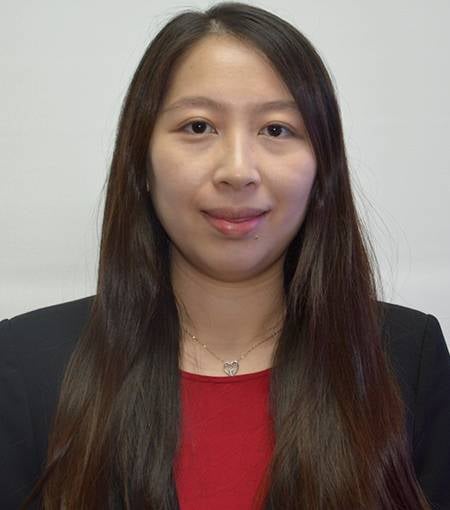
Dr Fong Pui Kwan
Senior Lecturer
Dr
PhD Cogn Sci (UNIMAS), BS Cogn Sci (UNIMAS)
Views from Our Community

Prof Patrice François Boursier
Programme Director, Master in Health Informatics and Analytics
Delivered by a multidisciplinary team of experts in computing and health related disciplines, students in this programme will be able to learn about state-of-the-art technologies and systems, either related to IT (for example data analytics, mobile applications, sensors and wearables) or healthcare (for example electronic health records and remote monitoring). This integrated MHIA degree prepares graduates for a range of careers in the healthcare sector across various settings where health improvement is sought, enhanced by technology.
FREQUENTLY ASKED QUESTIONS
Admission
Structure / Organisation
Cost
Careers
Latest News & Stories
Have a Question? Ask Us
INTERESTED IN APPLYING FOR ONE OF OUR PROGRAMMES?
A Word from the Programme Director

DR YAM WAI KEAT
Senior Lecturer and Programme Director
BSc (Hons) Bioinformatics (UM),
PhD in Structural Bioinformatics (USM)
“This programme has been designed to suit the needs of future health IT specialists and data scientists, enabling them to perform analyses and develop novel tools and methods for this rapidly growing field. It is aimed at students with diverse backgrounds, not limited to science related fields. Students will learn about the breadth of the fields of health informatics and analytics. They will be able to design, perform and enhance analyses with the appropriate methods and technologies to address practical medical and clinical questions. The Master in Health Informatics and Analytics leverages on the university teaching staff diversity – including computer science and informatics, biomedical, clinical and health sciences – alongside that of external industrial partners. This will deliver training across the breadth of health informatics and analytics from health informatics, epidemiology, clinical systems and bioinformatics.”




